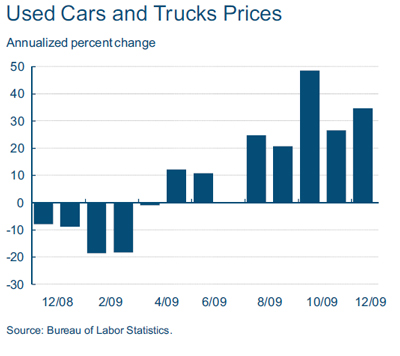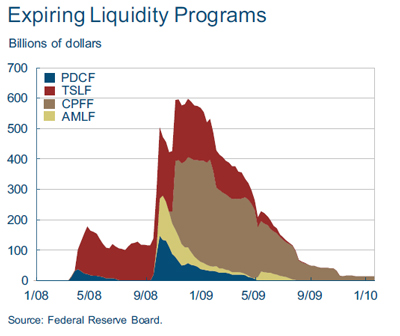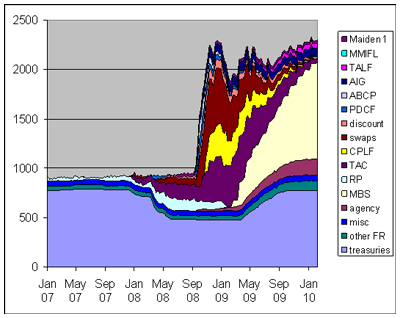Econbrowser‘s Menzie Chinn has written an interesting piece on ‘crowding out’:
A relevant question, is what happens when the Fed exits from quantitative easing (and relatedly, as slack in the economy declines). That being said, extreme upward pressure on interest rates, and reduction in investment expenditures, is not a foregone conclusion.
Crowding out has a strong hold on many people’s imagination. Some equate crowding out in the financial market with crowding out in the real side of the economy. Let me make a couple observations on why this simplistic equation need not hold.
First, the empirical magnitude of investment crowding out depends critically on the interest sensitivity of investment expenditures.
Second, if investment depends upon the change in GDP, as in a simple accelerator model (see a discussion of competing investment models here), then government spending that induces an increase in GDP can result in higher investment, despite an increase in interest rates.
Third, when one assumes three (or more) outside assets instead of two, then money and bonds are not necessarily substitutes. Benjamin Friedman laid out a model with money, bonds and equities/capital. Depending upon whether bonds are closer substitutes with capital or money, one can obtain crowding out or crowding in (see this powerpoint presentation).
I teach crowding out in the context of the IS-LM model. For those who want to work in the loanable funds framework, see DeLong, and Krugman.
Boyd Erman had a good column in the Globe & Mail today – Want to fix Ottawa’s books? Try working a bit harder. He starts off with the demographic problem – which Spend Every Penny considers “academic” – and ties it into lower Canadian productivity growth compared to the US:
It can’t be that Americans are more talented in almost every industry. Some of it has to come down to effort, to how hard Canadians squeeze their lemons, with all due respect to our self-image as a nation of sloggers.
A portion of the gap also seems to come down to risk taking. Americans will try new and novel ways to get at the last bit of juice in the lemon, even if there’s a chance it will fail, while Canadians default to the tried and true even if it’s less promising.
This is certainly true in the securities business. Imagine you work in New York as, say, an institutional bond salesman. You come up with a good idea for a new product or a new way of doing things or you want to provide one of your clients with a non-standard service … anything like that. So you go to your boss, tell him about it – and if it doesn’t take too much capital, he can approve it himself. If it takes more capital, there’s a clear path for approval and people are willing to work quickly because if the idea works they’re going to make some money too. And the deal is: if it works, you’re going to get rich. If it doesn’t work, you’re going to get fired. Wanna bet?
In Canada, I can tell you from personal experience that the environment for new products and new ideas is actively hostile. Each of the myriad approvals is granted by somebody who will be criticized if it fails, and not get anything if it works. There’s no clear path for approvals of anything, largely because management gets to be management by sucking arse and waiting for their boss to die. And, if by some miracle a new process gets off the ground and makes hundreds of millions of dollars for the firm … you’ll get your reputation blackened and get fired.
Retail stores work the same way, I believe. There is often criticism of the US on the grounds that it is “over-stored”, with too many stores chasing too few consumer dollars. But behind every one of these struggling stores – now going bankrupt by the boatload, just as in every recession – is somebody with an idea and a willingness to roll the dice with his capital while working sixteen hours a day.
I remember one anecdote along those lines; I can’t remember the non-American country, so I’ll call it Yougaria: A Yougarian looks at the rich folks’ mansions and feels bitter – because he knows in his heart that those mansions are built on his back. An American looks at the rich folks’ mansions and feels good – because he knows in his heart that one day he’ll be able to afford one just like it.
One of my favourite economists, Ken Rogoff (he’s a grandmaster at chess), had some interesting things to say about sovereign defaults:
Following banking crises, “we usually see a bunch of sovereign defaults, say in a few years,” Rogoff, a former chief economist at the International Monetary Fund, said at a forum in Tokyo yesterday. “I predict we will again.”
The U.S. is likely to tighten monetary policy before cutting government spending, sending “shockwaves” through financial markets, Rogoff said in an interview after the speech. Fiscal policy won’t be curbed until soaring bond yields trigger “very painful” tax increases and spending cuts, he said.
Another day of volume-good-results-bad as PerpetualDiscounts lost 15bp and FixedResets were flat. The day was enlivened by the GWO.PR.E call for redemption and the very expensive new issue of a 5.80% Straight by GWO.
| HIMIPref™ Preferred Indices These values reflect the December 2008 revision of the HIMIPref™ Indices Values are provisional and are finalized monthly |
|||||||
| Index | Mean Current Yield (at bid) |
Median YTW |
Median Average Trading Value |
Median Mod Dur (YTW) |
Issues | Day’s Perf. | Index Value |
| Ratchet | 2.81 % | 3.03 % | 32,560 | 20.38 | 1 | 0.3495 % | 1,962.1 |
| FixedFloater | 5.38 % | 3.48 % | 43,198 | 19.61 | 1 | 0.4475 % | 2,936.7 |
| Floater | 1.96 % | 1.68 % | 43,435 | 23.36 | 4 | 0.5621 % | 2,349.7 |
| OpRet | 4.87 % | 1.30 % | 102,111 | 0.26 | 13 | -0.0683 % | 2,309.2 |
| SplitShare | 6.35 % | -1.43 % | 127,654 | 0.08 | 2 | 0.1534 % | 2,150.3 |
| Interest-Bearing | 0.00 % | 0.00 % | 0 | 0.00 | 0 | -0.0683 % | 2,111.5 |
| Perpetual-Premium | 5.76 % | 5.55 % | 81,374 | 5.89 | 7 | -0.0170 % | 1,898.0 |
| Perpetual-Discount | 5.86 % | 5.91 % | 168,066 | 14.04 | 69 | -0.1537 % | 1,800.6 |
| FixedReset | 5.41 % | 3.57 % | 318,692 | 3.75 | 42 | -0.0035 % | 2,187.2 |
| Performance Highlights | |||
| Issue | Index | Change | Notes |
| TD.PR.O | Perpetual-Discount | -1.24 % | YTW SCENARIO Maturity Type : Limit Maturity Maturity Date : 2040-02-23 Maturity Price : 21.59 Evaluated at bid price : 21.59 Bid-YTW : 5.68 % |
| SLF.PR.E | Perpetual-Discount | -1.10 % | YTW SCENARIO Maturity Type : Limit Maturity Maturity Date : 2040-02-23 Maturity Price : 18.85 Evaluated at bid price : 18.85 Bid-YTW : 5.97 % |
| BAM.PR.B | Floater | 1.18 % | YTW SCENARIO Maturity Type : Limit Maturity Maturity Date : 2040-02-23 Maturity Price : 17.15 Evaluated at bid price : 17.15 Bid-YTW : 2.31 % |
| BAM.PR.O | OpRet | 1.21 % | YTW SCENARIO Maturity Type : Option Certainty Maturity Date : 2013-06-30 Maturity Price : 25.00 Evaluated at bid price : 25.91 Bid-YTW : 4.09 % |
| Volume Highlights | |||
| Issue | Index | Shares Traded |
Notes |
| BAM.PR.M | Perpetual-Discount | 54,093 | TD crossed 35,000 at 17.80. YTW SCENARIO Maturity Type : Limit Maturity Maturity Date : 2040-02-23 Maturity Price : 17.77 Evaluated at bid price : 17.77 Bid-YTW : 6.82 % |
| TRP.PR.A | FixedReset | 46,384 | YTW SCENARIO Maturity Type : Call Maturity Date : 2015-01-30 Maturity Price : 25.00 Evaluated at bid price : 26.08 Bid-YTW : 3.79 % |
| RY.PR.T | FixedReset | 44,400 | RBC crossed 39,100 at 27.88. YTW SCENARIO Maturity Type : Call Maturity Date : 2014-09-23 Maturity Price : 25.00 Evaluated at bid price : 27.88 Bid-YTW : 3.55 % |
| TD.PR.G | FixedReset | 35,607 | YTW SCENARIO Maturity Type : Call Maturity Date : 2014-05-30 Maturity Price : 25.00 Evaluated at bid price : 27.87 Bid-YTW : 3.49 % |
| BMO.PR.J | Perpetual-Discount | 32,632 | YTW SCENARIO Maturity Type : Limit Maturity Maturity Date : 2040-02-23 Maturity Price : 20.21 Evaluated at bid price : 20.21 Bid-YTW : 5.61 % |
| BAM.PR.H | OpRet | 31,554 | RBC crossed 19,300 at 26.01. YTW SCENARIO Maturity Type : Call Maturity Date : 2010-03-25 Maturity Price : 25.50 Evaluated at bid price : 26.02 Bid-YTW : -8.70 % |
| There were 39 other index-included issues trading in excess of 10,000 shares. | |||


